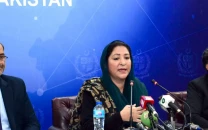India may use Afghan soil to destabilise Pakistan, warns PM
Trade and economic links will open a new era of cooperation between Pakistan and Afghanistan
Prime Minister Imran Khan said on Monday that the incumbent Indian government was the worst example of fascism despite its tall claim of being the largest democracy, and expressed the fear that India might use Afghan soil to destabilise Pakistan.
Inaugurating the two-day Pakistan-Afghanistan Trade and Investment Forum, seminar in Islamabad, the prime minister described peace in Afghanistan vital for regional peace and prosperity, stressing that trade and economic links would open a new era of cooperation between Pakistan and Afghanistan.
“Pakistan fears India will use Afghanistan to destabilise us,” the prime minister told the seminar. “We tried to be friends with India but could not succeed. We realise that India is ideologically against Pakistan,” he added.
Imran noted that Prime Minister Narendra Modi-led Indian government was against his country’s own Muslim population. “The treatment of Muslims in India today has never happened before,” he said. “Minorities in India have been under continuous suppression,” he added.
He said that the Modi government bent upon inflicting atrocities on innocent Kashmiri people. “It [lockdown in Indian Illegally Occupied Jammu and Kashmir] is the worst example of suppression and barbarity,” he added.
Amid opposition parties’ mounting pressure on the Kashmir issue, Imran said that the government had always raised the issue at every regional and international forum and would continue to raise this issue until the resolution of the Kashmir dispute as per the United Nations Security Council resolutions.
In his speech, Prime Minister Imran emphasised that “peace in Afghanistan is inevitable for regional peace and prosperity”, adding that “trade and economic links will open a new era of cooperation between Pakistan and Afghanistan”.
Hoping that the seminar would go a long way in boosting bilateral trade cooperation and building a long-lasting mutually beneficial relationships, Imran recalled that Pakistan and Afghanistan had been enjoying cordial relations for centuries and both countries shared religious and cultural traditions.
Stressing that the future of both the countries depended on their unity, mutual trade and enhanced economic interlinks, he called for facilitating the Afghan trade. He said both countries had vast potential of investment and economic activities, which would bring regional prosperity and development.
He said that Afghanistan had been facing war and conflict for the past four decades that incurred heavy losses in terms of both human resources and poverty. He reiterated that an Afghan-owned and Afghan-led peace process had been the chief concern of his government and “no other country in the world can take a credit equal to Pakistan for its efforts to maintain peace in Afghanistan”.
Imran noted that both Pakistan and Afghanistan could become the hub of trade and business due to the China-Pakistan Economic Corridor (CPEC). He lauded the efforts of National Assembly Speaker Asad Qaiser for bringing both the countries together on the mutual interest of trade, investment and business, as “people-to-people contact are vital for regional progress and development”.
Speaking on the occasion, Wolesi Jirga (Afghan Parliament) Speaker Mir Rehman Rehmani applauded the efforts of the Pakistani government to support Afghanistan in its efforts for bringing peace to the war-torn country.
Rehmani said that Pakistan and Afghanistan enjoyed shared religious and cultural values. He stressed the need for capitalising on the vast opportunities of trade and investment in both the countries. “Both the countries can progress and develop together with mutual cooperation,” he said.
He appreciated the steps taken by Pakistan government to facilitate the Afghan transit trade, saying that nowadays it took three days in clearance of a container on the border and adding that opening new border points for trade would further facilitate the traders.
Earlier, Speaker Asad Qaisar told the seminar that promotion of trade and economic links between Pakistan and Afghanistan would usher in a new era of socio-economic development that would help bring peoples of the two sides closer.
The Speaker said that 2,640 Kilometres Pak-Afghan border was not only the longest border that Pakistan shared with any of its neighbouring country, “it is also the thread that weaves our two nations into a historic tapestry of social, cultural, linguistic, economic, religious and fraternal ties”.
“It is important for the leadership of two sides to create harmony, develop understanding and build consensus amongst ourselves to seek solutions of our common problems,” Qaiser said. He called for building a united front against the biggest scourges of the time, especially, poverty and instability.
He observed that Pakistan and Afghanistan were strategically significant trading partners, however, trade between the two countries declined gradually. He called for eliminating trade barriers along with facilitating traders, which, he said, would not only enhance the trade volume between Pakistan and Afghanistan but also contribute greatly to poverty eradication and social uplift.
“Such initiatives will also increase employment opportunities for our peoples and decreasing non-tariff barriers on both sides of the border will enhance mutual trade” Qaisar said.
He pointed out that the establishment of Pakistan-Afghanistan Parliamentary Friendship Group and its task forces for encouraging people-to-people contact and facilitating bilateral and transit trade was a manifestation of Pakistan’s commitment to improving bilateral economic engagement with Afghanistan.
He also proposed the formation of a taskforce to oversee the terms of negotiations for the Afghanistan-Pakistan Transit Trade Agreement (APTTA), which will expire in 2021, saying that there was a need to take input from parliamentarians and institutional stakeholders from both sides for a comprehensive future trade agreement.
Qaisar reiterated Pakistan’s commitment in terms of promoting parliamentary diplomacy and said that Pakistan was ready to play its role in mounting strong linkages for mutually-beneficial trade relations with Afghanistan.
“A peaceful economic cooperation between Pakistan and Afghanistan and improved trade and transit facilities will help connect Arabian Sea shipping lanes with Central Asia, the National Assembly speaker remarked.
He told the seminar that Pakistan’s support for the Afghan peace process and the intra-Afghan negotiations has been acknowledged by the Afghan government as well as the international community and “we reiterate our continued support for the peace process”.
“The level of participation in this forum from both sides fills us with hope for the future of our relations” Qasair said, while expressing gratitude to the leader of Afghan delegation and other participants for attending seminar.


















COMMENTS
Comments are moderated and generally will be posted if they are on-topic and not abusive.
For more information, please see our Comments FAQ